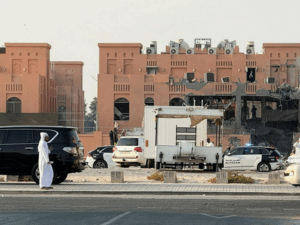With Doha strike, Israel signals a strategic shift and an indifference to consequences

Building targeted in Israel’s strike in Doha, Qatar on 9 September 2025
Amos Harel writes in Haaretz on 10 September 2025:
For some time now, Israel has seemed to be doubling down on its war with Hamas and perhaps on the entire Middle East as well. On Tuesday in Qatar’s capital, Doha, the stakes rose sharply when, in a joint operation by the Israel Defense Forces and Shin Bet security service, the Israel Air Force struck Hamas’ senior leadership outside Gaza.
Within Prime Minister Benjamin Netanyahu’s circle, the strike is already being hailed as a major achievement, not only militarily and in terms of intelligence, but strategically as well, one that’ll supposedly bring Israel closer to victory.
As always, such promises merit skepticism, and above all, attention must be paid to how this offensive move affects the fate of the hostages still held in Gaza. The threat to their lives is immediate, while the prospect of Hamas bending under pressure, if at all, is – at best – a question still to be answered.
The target of Israel’s strike in Doha was a meeting of Hamas’ negotiating team, led by the group’s chief negotiator, Khalil al-Hayya. The officials had gathered to discuss the latest U.S. cease-fire proposal as part of ongoing talks on a hostage deal.
According to early assessments, al-Hayya was killed. Other senior figures were present, and some appear to have been wounded or killed. Hamas has kept the details deliberately vague, but Doha is not Gaza’s Khan Yunis; the identities of those hit, and those who escaped, are likely to become clear within days if not hours.
In a statement, Netanyahu said the decision to authorize the strike was made in response to the shooting attack in Jerusalem on Monday, which killed six Israelis. The operational window opened only on Tuesday, he added, and the IDF and Shin Bet were immediately ordered to act.
The strike, carried out thousands of miles from Israel, is no longer an extraordinary feat in itself, coming after June’s war with Iran and repeated Israeli attacks on Houthi targets in Yemen. What makes it different this time is the location: Qatari soil, in a country Netanyahu has described as having “complex” relations with Israel.
When Mossad assassinated Ismail Haniyeh, Hamas’ former political bureau chief, in July 2024, the operation was staged in Iran, even though Haniyeh spent most of his time in Qatar.
Until now, Israel had avoided such action in Doha to preserve a diplomatic channel with the Qataris. But after the October 7 massacre, celebrated by Hamas leaders abroad with a public prayer of gratitude, the decision was made to target Hamas’ leadership outside of Gaza. That policy is now being implemented.
Khalil al-Hayya, one of the targets of the strike, last year. Credit: Khalil Hamra / AP
The more critical questions, however, concern the impact on future negotiations and the course of the war. Qatar has recently signaled its withdrawal from mediation efforts on a potential cease-fire, citing a lack of progress and Netanyahu’s repeated reversals on U.S.-backed proposals for either a partial or comprehensive agreement.
A sweeping strike on Hamas’ leadership may shift the balance of power vis-à-vis the group’s command inside Gaza, now led by its last surviving senior military commander, Izz al-Din al-Haddad. Yet the group’s leadership outside the Strip isn’t necessarily more hardline than al-Haddad, who remains hiding in Gaza’s tunnels and is determined to continue the war.
Decisions within Hamas are made collectively, with input from other power centers such as the leadership in the West Bank and imprisoned members held in Israel. Ironically, the group’s West Bank leadership – largely untargeted by Israel during this war – may emerge with greater influence.
All of Israel’s top defense chiefs, most prominently IDF Chief of Staff Eyal Zamir, told the security cabinet last month that the priority should be advancing a hostage deal. Zamir appears wary of the latest moves, arguing that Israel should first exhaust the negotiating track rather than launching the ground incursion into Gaza City, which is sought by Netanyahu and Defense Minister Israel Katz. Zamir. Maj. Gen. (res.) Nitzan Alon, head of the IDF’s Missing and Captive Soldiers Division, has repeatedly warned that a large-scale ground operation into the city could endanger the hostages’ lives.
Einav Zangauker speaking at a protest in Jerusalem last week. Credit: Naama Grynbaum
According to initial leaks following the strike in Doha, Israel had shared its plans with the United States. It’s unclear whether U.S. President Donald Trump approved the operation or whether Netanyahu confronted him with a fait accompli as the attack was already underway. It’s unlikely, however, that Israel would have moved forward in the face of an outright U.S. veto.
Trump has recently renewed his threats of total destruction against Hamas, delivered through Israel, if the group doesn’t accept the latest terms laid out in his cease-fire proposal last week. Yet Hamas is led by a determined cadre that doesn’t easily bend under external pressure.
On Tuesday, Israel escalated its offensive campaign and shattered a longstanding taboo against directly striking in Qatar’s sovereign territory. This may corner Hamas, but it won’t necessarily break the resolve of its remaining leadership.
The anguish expressed by Einav Zangauker, the mother of hostage Matan Zangauker, along with other hostage parents, is entirely understandable as their children’s lives are in immediate danger, from both the IDF’s ground incursion and the risk of retaliatory abuse or execution by their Hamas captors.
This article is reproduced in its entirety
